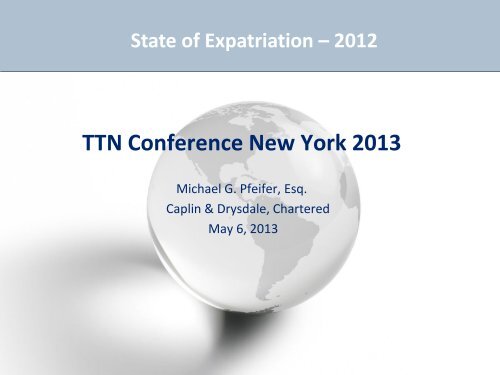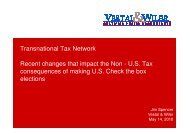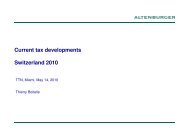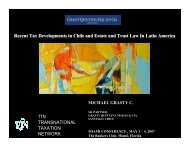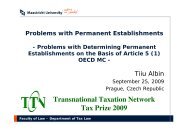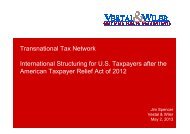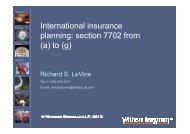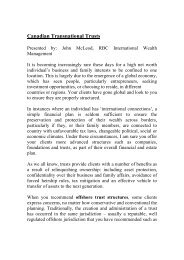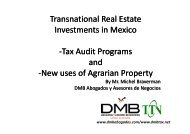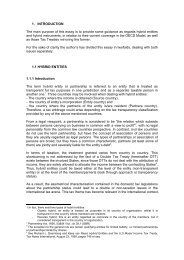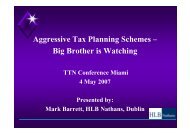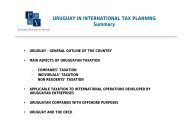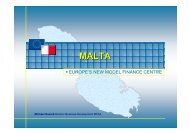Michael Pfeifer, Caplin & Drysdale, Washington, USA
Michael Pfeifer, Caplin & Drysdale, Washington, USA
Michael Pfeifer, Caplin & Drysdale, Washington, USA
You also want an ePaper? Increase the reach of your titles
YUMPU automatically turns print PDFs into web optimized ePapers that Google loves.
State of Expatriation – 2012<br />
TTN Conference New York 2013<br />
<strong>Michael</strong> G. <strong>Pfeifer</strong>, Esq.<br />
<strong>Caplin</strong> & <strong>Drysdale</strong>, Chartered<br />
May 6, 2013
Session Overview<br />
• HISTORY OF EXPATRIATION RULES (“Alternative Tax Regime”<br />
to “Mark-to-Market”)<br />
• MARK-TO-MARKET RULES (IRC § 877A)<br />
– Including Notice 2009-85<br />
• ESTATE AND GIFT TAX RULES (IRC § 2801)<br />
• POTENTIAL PLANNING ISSUES?<br />
2
History of Expatriation Rules<br />
• Foreign Investors Tax Act of 1966<br />
– US citizens who relinquish citizenship for “principal purpose of tax<br />
avoidance.”<br />
– 10-year “alternative tax regime” imposing tax on US source income<br />
expanded to include gains from sale of US securities.<br />
– Limited estate (IRC § 2107) and gift (IRC § 2501(a)(3)) rules.<br />
• Limited case law – Furstenberg v. Commissioner<br />
3
History of Expatriation Rules<br />
• Health Insurance Portability and Accountability Act of 1996<br />
– Significantly tightened “alternative tax regime.”<br />
– Expanded types of “US source income” subject to the regime.<br />
– Created presumptive tax avoidance standard based on 5- year<br />
average income tax liability or net worth at time of expatriation.<br />
– Included “long-term residents” (i.e., green card holders taxable as<br />
residents in 8 of the 15 pre-expatriation taxable years).<br />
– Permitted taxpayers to apply for ruling that no tax avoidance<br />
purpose.<br />
– Introduced limited reporting.<br />
4
History of Expatriation Rules<br />
• American Jobs Creation Act of 2004<br />
– Further tightened “alternative tax regime.”<br />
– Dropped principal tax avoidance test in favor of straight income tax<br />
liability or net worth tests.<br />
– Added 5-year US tax compliance certification.<br />
– New definition of expatriation date requiring dual notice to DOS/DHS<br />
and IRS (Form 8854).<br />
– Added 30-day short residence rule applicable for all tax purposes in<br />
any of 10 post-expatriation years.<br />
– Enhanced reporting to annual basis regardless of tax liability.<br />
5
History of Expatriation Rules<br />
• Heroes Earnings Assistance and Relief Tax Act (HEART Act) of<br />
2008<br />
– Added § 877A “mark-to-market”/exit tax.<br />
• Exceptions for deferred compensation, “specified tax deferred<br />
accounts” and interests in non-grantor trusts.<br />
– Added § 2801 “succession/inheritance” tax.<br />
– Alternative tax regime still applicable to persons subject to<br />
prior law.<br />
6
HEART Act Rules<br />
• “Covered Expatriate” – same as under prior law<br />
– Income tax liability test (indexed for inflation; $155,000 in 2013);<br />
net worth test ($2 million; not indexed); AND tax certification test<br />
(tax compliant for 5 previous years; if don’t certify, covered<br />
expatriate even if under financial thresholds).<br />
• Exceptions:<br />
– Certain dual citizens from birth; not US substantial presence<br />
resident > 10 of prior 15 years; and taxable as “resident” of other<br />
country of nationality.<br />
– US citizens under age 18 ½ not substantial presence residents > 10<br />
years.<br />
7
HEART Act Rules<br />
• “Mark-to-Market Tax - deemed sale of worldwide assets (excepting<br />
3 categories mentioned above) on day before expatriation date at<br />
applicable rates on gains in excess of $600,000 (indexed for<br />
inflation; $668,000 in 2013).<br />
– Can elect to defer tax on asset-by-asset basis if “adequate security” provided<br />
(with 30-day cure period); deferral until asset sold/transferred or taxpayer<br />
dies, if sooner; taxpayer must agree to waive tax treaty benefits; interest<br />
accrues on deferred tax at underpayment rate.<br />
– Basis step-up (but not down) rule for long-term residents for purposes of<br />
calculating gain.<br />
– Ownership and valuation based on estate tax principles.<br />
– All nonrecognition deferrals and tax payment extensions terminated as of day<br />
before expatriation.<br />
8
HEART Act Rules<br />
• Deferred Compensation Items:<br />
– “Deferred Compensation” broadly defined.<br />
– “Eligible Deferred Compensation” (i.e., US payor): subject to 30%<br />
withholding tax on taxable portion under IRC § 871 rules.<br />
– “Ineligible Deferred Compensation” (i.e., non-US payor): present<br />
valued and includible in income on day prior to expatriation date at<br />
marginal tax rates (unless non-US payor elects to be treated as US<br />
payor under guidance to be issued – or not?).<br />
– Exception for deferred compensation attributable to non-US services<br />
performed while taxpayer not a US resident.<br />
– Retirement plan payments excepted from early distribution<br />
penalties.<br />
9
HEART Act Rules<br />
• Specified Tax Deferred Accounts: A covered expatriate’s<br />
entire interest in following accounts includible in income on<br />
day prior to expatriation date:<br />
(1) individual retirement plan (including roll-over IRA’s);<br />
(2) qualified tuition program;<br />
(3) Coverdell education savings account;<br />
(4) health savings account; and<br />
(5) Archer MSA.<br />
10
HEART Act Rules<br />
• Non-grantor Trusts. Post-expatriation distribution from non-grantor<br />
trust in which taxpayer considered to have beneficial interest prior to<br />
expatriation subject to 30% withholding tax on the “taxable portion”<br />
under IRC § 871 rules; no time limit on taxation of distributions.<br />
− “Non-grantor trust” defined as any trust of which taxpayer is not grantor<br />
immediately prior to expatriation date.<br />
• Broad definition; includes trusts that are grantor trusts as to other persons;<br />
legislative intention? IRS position?<br />
− Non-grantor trust must recognize gain on distributions of appreciated<br />
property.<br />
– Taxpayer deemed to waive any treaty benefits, unless obtains special IRS<br />
ruling to have ascertainable value of beneficial interest includible in income<br />
on day prior to expatriation date.<br />
– If non-grantor trust becomes grantor trust after expatriation treated as<br />
taxable distribution.<br />
– Potential foreign tax credit issues under IRC § 906.<br />
11
HEART Act Rules<br />
• Date of Expatriation<br />
– US citizens: date of relinquishment of US nationality; earliest of<br />
(1) renunciation, (2) voluntary relinquishment, (3) DOS issues<br />
Certificate of Loss of Nationality, or (4) US court cancels<br />
certificate of naturalization.<br />
• Possible unconstitutional retroactive tax legislation?<br />
– Long-term residents: date of cessation of lawful permanent<br />
resident status; if “tie-break” residence under treaty, date of<br />
“commencement” of foreign residence if don’t waive treaty<br />
benefits.<br />
12
HEART Act Rules<br />
• Reporting Requirements:<br />
– Form 8854 must be “timely filed” with final income tax return or else<br />
deemed to be “covered expatriate.”<br />
– Annual Form 8854 filing for eligible deferred compensation items,<br />
beneficial interests in non-grantor trusts and taxpayers who deferred<br />
payment of tax.<br />
– In case of income items excepted from mark-to-market rule, Form W-<br />
8CE to be filed with payor by earlier of first post-expatriation<br />
distribution or 30 days after expatriation date.<br />
• Likely loosely enforced.<br />
– If foreign fiduciary fails to withhold 30% tax, taxpayer required to file<br />
Form 1040NR per Reg. § 1.6012-1(b).<br />
13
HEART Act Rules<br />
• “Covered Gifts/Bequests”: Under IRC § 2801, US persons<br />
receiving gifts or bequests from “covered expatriate” under<br />
HEART Act will be taxed at the highest applicable gift or estate<br />
tax rate (40% in 2013).<br />
– Exceptions for annual exclusion gifts and gifts or bequests entitled to<br />
marital or charitable deduction.<br />
– Exceptions also for amounts shown on timely filed gift or estate tax<br />
return.<br />
– Reduction for any gift or estate tax paid to a foreign country with<br />
respect to the property transfer.<br />
– Inapplicable to transfer made while taxpayer subject to tax as US<br />
citizen or resident?<br />
14
HEART Act Rules<br />
• Gifts/Bequests in Trust:<br />
– If to domestic trust, taxable to trust.<br />
– If to foreign trust, distributions received by US persons that are<br />
attributable to transfer by covered expatriate taxable; income tax<br />
credit for IRC § 2801 tax on income portion only<br />
• Time Limit: As with 30% tax on distributions from non-grantor<br />
trusts, no time limit on application of IRC § 2801 after expatriation.<br />
15
HEART Act Rules<br />
• IRC § 2801 reporting requirements:<br />
– Separate guidance to be issued by IRS.<br />
– Reporting/tax obligations for gifts/bequests received after June<br />
17, 2008 are deferred until guidance is issued.<br />
16
HEART Act: Omissions and Need for Guidance<br />
• Guidance needed under IRC § 877A:<br />
− Election for foreign payer of deferred compensation to be<br />
treated as US payer.<br />
− Coordination with tax treaties and foreign tax credit issues,<br />
especially IRC § 906.<br />
• General guidance under IRC § 2801<br />
• Reconsideration of “Reed amendment”<br />
17
Practical & Planning Issues/Strategies<br />
• Expatriation by Long-Term Residents<br />
– No statutory exceptions to “covered expatriate” status<br />
– Try to reduce net worth below $2 million<br />
• If US domiciled, make gifts (if not domiciled, should IRC § 2801 apply?)<br />
• Are assets subject to community property rules?<br />
– Treaty “tie-break” US residence with amended return(s) to avoid<br />
long-term resident status or expatriate under pre-HEART Act law<br />
• Can’t amend prior joint returns<br />
• SOL issues: IRS generally won’t process returns for closed years (assume<br />
6-year maximum, unless IRS opens by asserting prior open SOL)<br />
– Try to time expatriation via, e.g., use of re-entry permits<br />
– If all else fails, change-up assets or become US citizen! (appropriate<br />
cases only)<br />
18
Practical & Planning Issues/Strategies<br />
• Expatriation by US citizens<br />
– Is “dual national from birth” or “under 18 ½“ exception available?<br />
• Foreign resident taxpayer – any limits?<br />
• Not “substantial presence resident” > 10 years? Is “closer connection”<br />
test available?<br />
– Try to reduce net worth below $2 million (as above)<br />
• Application of “certification of 5-year compliance test”<br />
– When is standard met?<br />
– Must information returns and FBAR’s be filed?<br />
– What if under audit or participant in voluntary disclosure program?<br />
– What if long-term non-filer (e.g., inadvertent US citizen)?<br />
19
Practical & Planning Issues/Strategies<br />
• Non-tax factors<br />
– Need non-US passport<br />
• Consider whether any high-quality “heritage” passports available<br />
• Few “economic” passports currently available<br />
• If future US visits desired, consider visa status<br />
• Consider foreign tax implications<br />
– Relinquishing US citizenship<br />
• Need to locate suitable US overseas outpost and make appointment<br />
• Issues with minors under 18 (DOS won’t consider minors under 16)<br />
20
Questions?<br />
21
Thank You<br />
<strong>Michael</strong> <strong>Pfeifer</strong><br />
<strong>Caplin</strong> & <strong>Drysdale</strong><br />
One Thomas Circle, N.W.<br />
Suite 1100<br />
<strong>Washington</strong>, DC 20005<br />
O: 202.862.5085<br />
F: 202.429.3301<br />
mpfeifer@capdale.com<br />
www.caplindrysdale.com<br />
The information contained in this presentation provides background information about certain legal issues and should not be regarded as rendering legal<br />
advice to any person or entity. As such, the information is not privileged and does not create an attorney-client relationship with <strong>Caplin</strong> & <strong>Drysdale</strong>,<br />
Chartered, or any of the firm’s lawyers. This presentation does not constitute an offer to represent you, and you should not act, or refrain from acting, based<br />
upon any information so provided. In addition, the information contained in this presentation is not specific to any particular case or situation and may not<br />
reflect the most current legal developments, verdicts, or settlements. In the event that you have questions about and are seeking legal advice concerning<br />
your particular situation in light of the matters discussed in the presentation, please contact us so that we can take the necessary steps to form an attorneyclient<br />
relationship if that is warranted.<br />
22


